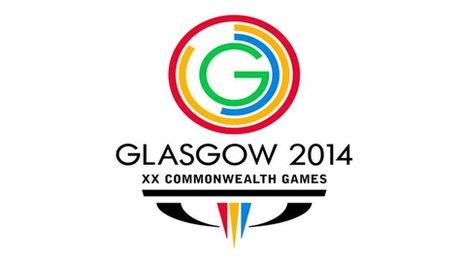Glasgow 2014: Which is the strongest Commonwealth nation?
- Published
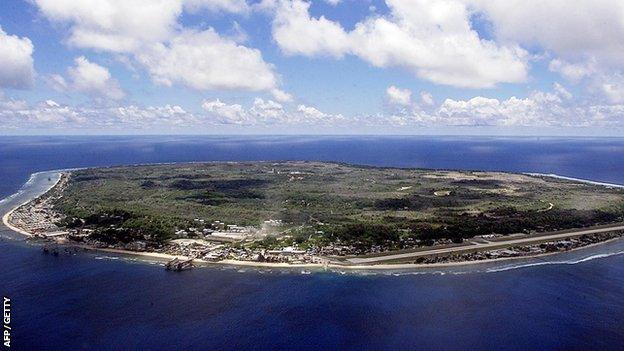
It only takes about half an hour to do a lap of Nauru on the island's perimeter road
Glasgow 2014 Commonwealth Games |
Dates: 23 July to 3 August |
Coverage: Live on BBC TV, HD, BBC Radio 5 live, Red Button, Connected TVs, online, tablets and mobiles |
When it comes to the Commonwealth Games, which nation is the most successful?
Australia perhaps, given their proud sporting tradition and love of beating England at anything? South Africa, maybe? Or how about Canada?
Wrong, wrong and wrong again.
It's a remote island in the South Pacific which measures only 8.1 square miles in area (less than an eighth the size of Glasgow, which is about to host the 20th edition of the Games) and has been covered in bird droppings for thousands of years.
A largely barren dot in the ocean, its 10,000 or so inhabitants are among the fattest on the planet. Diabetes is a major public health problem there.
Yet Nauru, the world's smallest republic, has been by far and away the most successful sporting nation in the Commonwealth since they started competing at the Auckland Games in 1990.
They have won 28 medals since then, including 10 golds. All have come in weightlifting.
In a population-adjusted league table produced by BBC Sport, Nauru - which lies more than 2,000 miles (3,200km) north-east of Brisbane and financially relies heavily upon the mining of the phosphates formed by those seabirds - has been 45 times more successful than second-placed Samoa - 1,700 miles (2,700km) away to the south-east.
How did BBC Sport calculate the population-adjusted Commonwealth Games league table? |
|---|
We excluded nations which had not competed in at least three of the last six Games. |
We researched each nation's population in all six Commonwealth Games years from 1990 to 2010 inclusive. |
From these figures, we calculated an average population for each country before examining the medal table from the corresponding six Games. |
In order to weight the achievements more accurately, we awarded three "medal points" for a gold, two for silver and one for bronze. |
Dividing average population by average medal points gives us "people per medal point" - the basis for our league table. |
Looking at the results, it is clear that Nauru beats the rest of the Commonwealth hands down.
Per capita, which is the most successful country in Commonwealth Games from 1990? | ||||
|---|---|---|---|---|
Rank | Country | Average Population (1990-2010) | Average Medal Points | People per Medal Point |
1 | Nauru | 9,833 | 9.17 | 1,073 |
2 | (Western) Samoa | 174,721 | 3.83 | 45,579 |
3 | Australia | 19,335,367 | 402.83 | 47,998 |
4 | Bahamas | 304,541 | 6.00 | 50,757 |
5 | Seychelles | 80,140 | 1.50 | 53,427 |
6 | New Zealand | 3,877,617 | 72.33 | 53,608 |
And if the previous six editions of the Commonwealth Games are anything to go by, Nauruans are 71, 112, 118 and 176 times more successful than those who respectively hail from Wales, Scotland, Northern Ireland or England.
How about countries in the British Isles? | ||||
|---|---|---|---|---|
Rank | Country | Average Population (1990-2010) | Average Medal Points | People per Medal Point |
7 | Isle of Man | 76,714 | 1.33 | 57,536 |
9 | Wales | 2,922,483 | 38.33 | 76,239 |
11 | Guernsey | 62,258 | 0.67 | 93,387 |
13 | Scotland | 5,109,067 | 42.67 | 119,744 |
14 | Northern Ireland | 1,693,350 | 13.33 | 127,001 |
15 | Jersey | 89,459 | 0.67 | 134,188 |
17 | England | 49,565,917 | 262.17 | 189,063 |
So what's Nauru's secret?
It all began in the late 1980s when a short and stocky teenager called Marcus Stephen "accidentally" discovered a sport which would ultimately see him win countless gold medals, become his country's president, have a chat with US opposite number Barack Obama at the United Nations, and meet the boss of the Commonwealth herself, the Queen.
Commonwealth Games 2014: Watch Marcus Stephen's 1990 winning lift
Looking back, Stephen - who would go on to claim seven golds and five silvers in his four Commonwealth Games between 1990 and 2002 - said he was "just a normal island boy, playing Aussie Rules football" before leaving for high school and university in Melbourne, where he also excelled in cricket and rugby.
"It was by accident I did weightlifting - Australia had a development programme where all kids in Victoria would do the clean and jerk.
"I won my division in my region and got recruited by the Victorian coach. They never knew I was Nauruan until I became good."
After finishing second in the Oceania Championships while still a schoolboy, he impressed in several other competitions.
But there his story could easily have ended.
As Auckland 1990 approached, there was a bit of a problem. While Nauru was a member of the Commonwealth, it had never competed in its biggest sporting event.
Stephen's Olympic memories |
|---|
"My best result in three Olympics (Barcelona 1992 for Samoa because Nauru didn't have its own team at that point; Atlanta 1996 and Sydney 2000) was eighth place in Barcelona. |
"It was the proudest moment in my life to march into the arena for the Opening Ceremony. |
"Atlanta was big - we had to walk a good kilometre to the Opening Ceremony stadium. My mother was in the team [as a national official] and she couldn't keep up. |
"Later we found her marching with the Philippines, our uniform was the same colour!" |
After some intense lobbying by Stephen, though, Nauru was finally admitted to the Games family on the eve of the Games.
Stephen, then aged 20, may have been Nauru's sole representative in New Zealand but he did his country proud.
"I went there and hoped for the best and I trained very hard," he said.
"I won a gold and two silver medals, and the whole island went crazy. When I came back home, the president declared a public holiday.
"It was something special - the whole nation was listening in via phone as we did not have live television or radio. A Nauruan rang the island [from Auckland] and spoke on the phone. As each lift took place, they all listened in."
After retiring from the sport, Stephen worked for Nauru's national bank before becoming an MP in 2003 and, four years later, president.
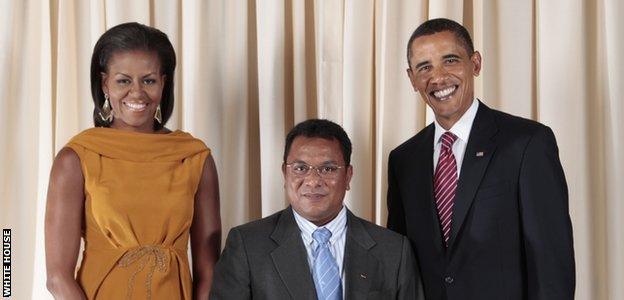
Former Nauruan president Marcus Stephen (centre) meets his US counterpart Barack Obama and the American First Lady Michelle
That afforded him an exclusive seat at the world's top table, and an audience with "the very tall" US president Barack Obama.
"Never in my wildest dream did I think I would meet such a person," he said.
So what did the world's most powerful man say to one of the world's most powerful men?
"We didn't say much but the usual pleasantries of 'hullo' and 'how is Nauru' etc. He is a busy man, which I can understand."
Stephen continues to be heavily involved in sport on Nauru, and is currently the head of the island's Olympic committee, overseeing the next generation of talent.
But is there more to it than a community simply being inspired by one of their own? Are Nauruans as ideally suited to the snatch and clean-and-jerk as Jamaicans seemingly are to sprinting?
"Our build is perfect for weightlifting," acknowledges Stephen, who despite standing only 5ft 3in (160cm) tall and weighing in at less than 62kg (9st 10lb) during his competition days, managed to lift 172kg - nearly three times his own weight and only 3kg off the then world record.
"We are not a tall race but are stocky - we are pretty explosive too," Stephen explained. "We eat a lot of fish, which is the staple diet on Nauru and provides a lot of protein."
But it's not just fish which gets most Nauruans salivating.
What's the most dangerous place in Nauru? |
|---|
"Between a Nauruan and the food table at a Nauru state banquet!"Rod Henshaw, former Nauruan government adviser |
Rod Henshaw, a former radio presenter from the Australian Broadcasting Company, lived and worked on Nauru for many years, first as a government media advisor and then as a hotelier.
"The most dangerous place to stand in Nauru is between a Nauruan and the food table at a Nauru state banquet," he joked, albeit with a degree of seriousness, before adding that because of a shortage of arable land, the vast majority of fruit and vegetables has to be imported.
"To regularly get fruit and veg is a big strain on the budget. There are a lot of Chinese restaurants though on the island - lots of rice, meat and noodles."
Peter Law, who until earlier this year was the island's resident magistrate, said: "When I spoke to my court staff about fruit and vegetables they simply expressed the view that they weren't very interested because they don't normally eat them."
This may explain why nearly a quarter of the population has diabetes - one of the highest rates in the world - and why, according to the World Health Organization, more than 70% of islanders were classified as obese in 2008.
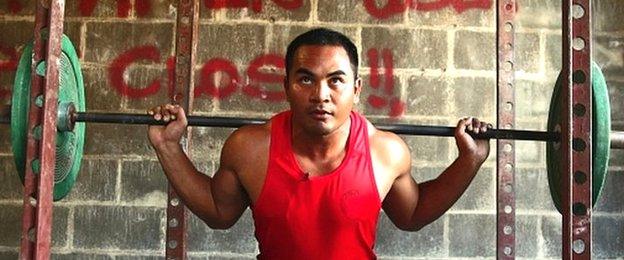
Deamo Bagugo, who is competing for Nauru at Glasgow 2014, started weightlifting when he was 12
Stephen admits diabetes "is a big problem for us - that is why sport is so important. We must give our children the opportunity to compete at the highest level and give them the chance to live their dreams."
But how likely are youngsters on the island to be inspired by hearing the Nauruan national anthem in Glasgow this summer?
"Pound-for-pound we are the most successful team in the Commonwealth Games, and it is by no accident," says the now 44-year-old Stephen. "It is a statistic we are very proud of and everyone on the island knows this.
"We don't send holidaymakers; we send a small team (of 10) who are of a very high quality. We know our targets and we set ourselves very high goals.
"In weightlifting, the strongest man in the Commonwealth is super heavyweight Itte Detenamo - he will go very close.
"Our boxers are coming up and don't be surprised if we do well."
- Published3 July 2014
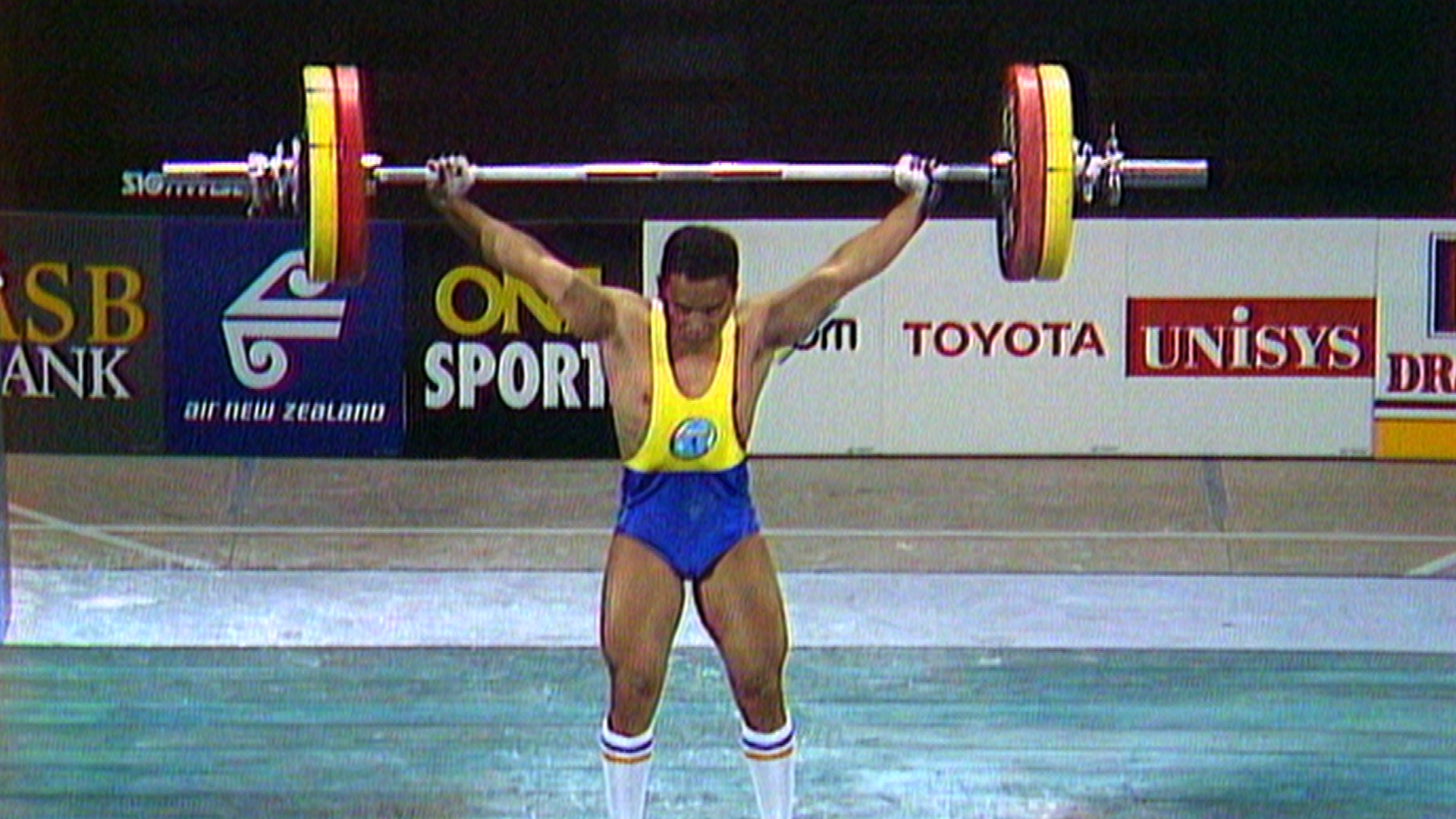
- Attribution
- Published21 November 2013
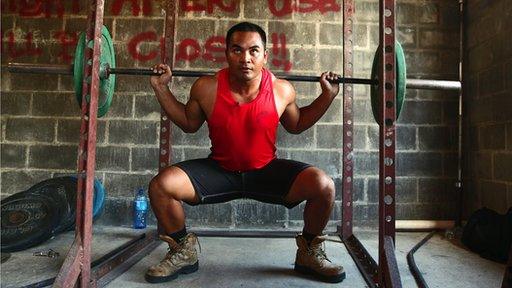
- Attribution
- Published27 October 2023
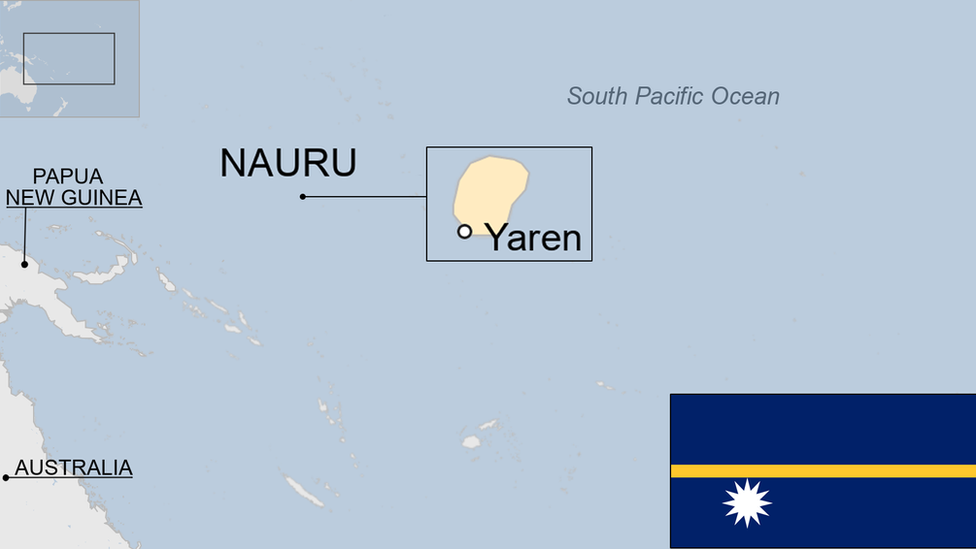
- Published20 May 2014
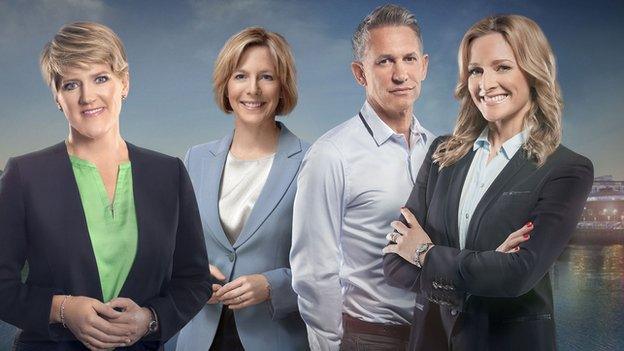
- Published16 July 2014
